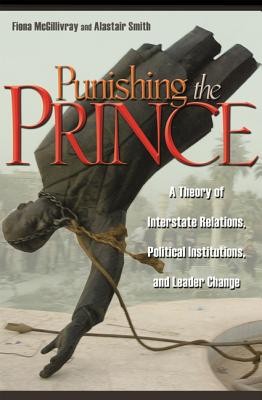
- We will send in 10–14 business days.
- Author: Fiona Mcgillivray
- Publisher: Princeton University Press
- ISBN-10: 0691136076
- ISBN-13: 9780691136073
- Format: 15.5 x 22.9 x 1.5 cm, minkšti viršeliai
- Language: English
- SAVE -10% with code: EXTRA
Reviews
Description
When the United States invaded Iraq, President Bush made it clear: the U.S. was not fighting the Iraqi people. Rather, all quarrels were solely with Iraq's leadership. This kind of assertion remains frequent in foreign affairs--sanctions or military actions are imposed on a nation not because of its people, but because of its misguided leaders. Although the distinction might seem pedantic since the people suffer regardless, Punishing the Prince reveals how targeting individual leaders for punishment rather than the nations they represent creates incentives for cooperation between nations and leaves room for future relations with pariah states.
Punishing the Prince demonstrates that theories of leader punishment explain a great deal about international behavior and interstate relations. The book examines the impact that domestic political institutions have on whether citizens hold their leaders accountable for international commitments and shows that the degrees to which citizens are able to remove leaders shape the dynamics of interstate relations and leader turnover. Through analyses of sovereign debt, international trade, sanctions, and crisis bargaining, Fiona McGillivray and Alastair Smith also uncover striking differences in patterns of relations between democratic and autocratic states. Bringing together a vast body of information, Punishing the Prince offers new ways of thinking about international relations.
EXTRA 10 % discount with code: EXTRA
The promotion ends in 22d.15:32:17
The discount code is valid when purchasing from 10 €. Discounts do not stack.
- Author: Fiona Mcgillivray
- Publisher: Princeton University Press
- ISBN-10: 0691136076
- ISBN-13: 9780691136073
- Format: 15.5 x 22.9 x 1.5 cm, minkšti viršeliai
- Language: English English
When the United States invaded Iraq, President Bush made it clear: the U.S. was not fighting the Iraqi people. Rather, all quarrels were solely with Iraq's leadership. This kind of assertion remains frequent in foreign affairs--sanctions or military actions are imposed on a nation not because of its people, but because of its misguided leaders. Although the distinction might seem pedantic since the people suffer regardless, Punishing the Prince reveals how targeting individual leaders for punishment rather than the nations they represent creates incentives for cooperation between nations and leaves room for future relations with pariah states.
Punishing the Prince demonstrates that theories of leader punishment explain a great deal about international behavior and interstate relations. The book examines the impact that domestic political institutions have on whether citizens hold their leaders accountable for international commitments and shows that the degrees to which citizens are able to remove leaders shape the dynamics of interstate relations and leader turnover. Through analyses of sovereign debt, international trade, sanctions, and crisis bargaining, Fiona McGillivray and Alastair Smith also uncover striking differences in patterns of relations between democratic and autocratic states. Bringing together a vast body of information, Punishing the Prince offers new ways of thinking about international relations.


Reviews